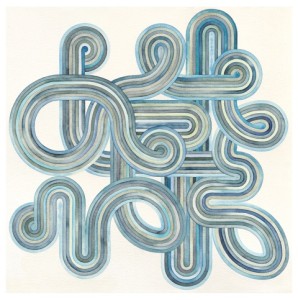
Artist
IMAGES: To download, click above.
PHOTO CREDIT: Dianna Walla
LINKS:
Chris Walla
Trans Records
Chris Walla
Tape Loops
Trans Records
October 16, 2015
Chris Walla has said little publicly about his 2014 departure from Death Cab for Cutie, a band that he co-founded and called home for 17 years. He begins to break his silence with Tape Loops, a full-length album that doesn’t so much provide answers or explanations, but invites the listener into the instrumental landscapes of his inner world.Sidestepping the specificity of narrative songwriting in favor of immersive aural topographies, Chris Walla’s Tape Loops offers up a quietly dynamic listen that is as beautiful as it is masterful. Leaning into the constraints of analog loop-based recording, Walla’s virtuosity as a composer and producer shines. The album’s richly layered arrangements reveal their powerful intricacies little by little.
The practice of manipulating physical tape is not new—but it is an art form requiring meticulous focus, courage, an intense sense of purpose, openness and patience—and it has been largely abandoned. Pioneers of the process, such as Steve Reich, Robert Fripp and Brian Eno finished creating their respective loop masterpieces and had moved on from the form by the late 1970s. Today, digital loop-based recording is a mainstay of pop music; anything a composer wants to loop infinitely is just a click away. So why bother making an album using piles of decaying magnetic tape, finicky machines and razor blades?
“I can’t change a closed, physical tape loop with a mouse-click or a keystroke, and that’s precisely the point,” Walla explains. “Digital recording and editing often feels like working in a spreadsheet—it’s not always a place for dreams.”
In a tape-based recording session, Walla’s commitment to the process and mechanics of analog music-making results in an sonic Rorschach of sorts—as the songs progress, the loops sound different even when they’re not. The variations are relational and, just as often, the projection of one’s own consciousness. In this way, Walla’s Tape Loops has a subtle living room quality that encourages the listener to inhabit it as their own.
Even with song titles providing the only literal cues, it’s clear that Tape Loops puts forth an intimate view of Walla’s own monomyth. The album is infused with oscillations of arrival and departure, of both a coming home and starting anew. “Kanta’s Theme” frames the record with its spare, slightly melancholic progressions, evoking Japanese dreamscapes and journeys into the unknown; “I Believe In the Night” is the most melodic of the album, but in place of a lyrical track, one finds the disconcerting hum of fluorescent lighting, asserting Walla’s departure from songwriting and the confines of commercially-driven composition. “Goodbye” says as much between the notes as with them. Sad and static-y, bereavement and letting go take on a tactile quality as one can nearly feel Walla pulling away from his former life.
Throughout its contemplative soundscape, Tape Loops reminds us that whatever engages the unarticulated parts of the mind can transport us to a state of just being, where life is as it is and emotions roll through us. Concordant with its poignantly introspective nature, the pursuit of pleasure in Tape Loops is paramount, and Walla’s devotion to beauty is his salvation.Chris Walla is a writer, musician and record producer. Tape Loops is his first solo album since Field Manual (2008). A founding member of Death Cab for Cutie, he was the guitarist, producer and co-writer from 1997 to 2014. His recent work includes collaborations with S, the Thermals, the Lonely Forest, William Fitzsimmons, and Rocky Votolato.




